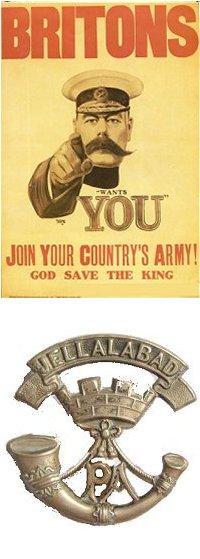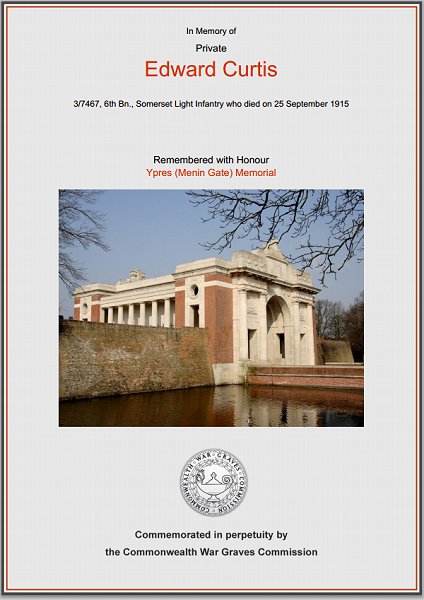yeovil at War
Edward Curtis
Killed in action during the attack on Bellewaarde
Edward Curtis was born in Yeovil in 1877, the son of gardener John Curtis (b 1836) and his wife Ann (b 1843). In the 1891 census John and Ann were living at Vincent Place with their children John Marsh (b 1868), Annie (b 1874), Edward, Charles (b 1879), Sydney (b 1881) and Florence (b 1884). 14-year old Edward listed his occupation as a glove cutter's apprentice.
In the spring of 1899 Edward married Lucy Maude Vickery, known as Maude, at Yeovil. They were to have two sons; Thomas John Edward (b 1900) and Leonard Bertram (1904-1988), known as Bert. In the 1901 census Edward and Maude were living at 19 Belmont Street with baby Thomas as well as Maude's two brothers Leonard and Benjamin. Edward gave his occupation as Glove Machinist and worked at the glove factory of Ewens, Johnson & Co Ltd.
From his Service Number 3/7467 it appears that Edward enlisted in the Territorial Army at Yeovil during the autumn of 1904. He became a Private in the 3rd Battalion, Somerset Light Infantry.
The 1911 census listed the family still at 19 Belmont Street and Edward gave his occupation as a glove cutter. Edward later moved his family to 2 Eastland Road.
 At
the outbreak of
war Edward, as a
Reservist, was
immediately
called up and
joined the 6th
(Service) Battalion,
Somerset Light
Infantry that
was formed in
August 1914.
At
the outbreak of
war Edward, as a
Reservist, was
immediately
called up and
joined the 6th
(Service) Battalion,
Somerset Light
Infantry that
was formed in
August 1914.
The 6th Battalion crossed the Channel on 21 May 1915. They were in billets for the first few weeks and spent their time as working parties digging trenches southwest of Ypres. The 6th Battalion commenced its first tour in the front line on 12 June 1915.
On 26 July 1915, while at Hooge, the Battalion was subjected to a new weapon of war - the flamethrower. This event is described in the Regimental History of the Somerset Light Infantry "Very early in the morning the front-line trenches of the Brigade were suddenly flooded by liquid fire, which belched from jets in the German lines opposite. This new device momentarily caused surprise and confusion, and the victims of this dastardly attack fell back from the front-line trenches which were then occupied by the enemy."
The rest of July and August passed in day-to-day trench warfare with, as the Regimental History points out "Two days in and two days out of the front line was the rule at this period, but between the miserable conditions of the billets and the filthy state of the trenches there was little choice."
|
A
letter
published
in the
Western
Gazette,
13
August
1915
from
"Letters
home to
Yeovil
in the
Great
War,
1914 –
1919"
by Jack
Sweet |
However in mid-September the 6th Battalion were in preparation for an attack at Bellewaarde, a subsidiary action at Hooge. The attack, on the 25th September, on the trenches held by the Germans in the vicinity of Hooge and Bellewaarde Lake was made with the object of distracting attention from a "full-dress" attempt to break through at Loos, to the south, and to contain the enemy's reserves. Like so many similar attacks, it entailed heavy losses to the attacking infantry. Zero hour was fixed for 4:20am and the preliminary bombardment was to open at 3:50am. The enemy trenches were reached but could not be held but, according to the Regimental History of the Somerset Light Infantry, "The Battalion held on all day in trenches.... with fierce tenacity and splendid courage, held on all day in the face of a terrible bombardment.... About 5pm the enemy's artillery fire gradually became less and by 7pm had almost died down.... In other ranks the Battalion had lost 11 killed, 38 wounded and 3 missing."
Sadly, Edward Curtis was one of those who were killed in action. He was 38 years old. Another Yeovil man killed in this action was 19-year old Leonard Gale.
On 1 October 1915, the Western Gazette reported "During the early part of the week rumours were in circulation as to the proposed heavy casualties of a certain Somerset Battalion, which was known to have been in the trenches on Friday. The careless repetition of them caused much distress to relatives and friends of men who without any certain information were said to have been killed or wounded and of whom no news had been received. Careful enquiries failed to trace the source of these rumours. It was even said that Colonel Marsh had a full list of the killed and had been charged with the duty of breaking the news to the relatives, but Colonel Marsh told our representative that he had no such list, and moreover knew of no such heavy casualties in the Somerset Battalion. Letters since received in the town by wives and relatives of men serving with the Battalion mentioned, and written in the trenches on Sunday and Monday, mention the death of Lance-Corporal Curtis, but do not speak of any other Yeovil man being hit. In fact one of the letters contains the phrase:- “All the Yeovil boys are well, except poor old Curtis.” Unfortunately, however, it is true that Lance-Corporal E Curtis, of 2 Eastland Road, who was recently wounded in the face, but made a rapid recovery, and was able to resume his place in the firing line, has been killed. The sad intelligence was conveyed in a letter sent home by a comrade of the deceased who was fighting by his side, and is all the more painful as he was expected home on leave this week. Deceased, who was a man of fine physique, was connected with the old Volunteer Force, and also the Territorial Force for many years, and joined the National Reserve just previous to the outbreak of war. By trade he was a glove-cutter, employed at Messrs. Ewens & Johnson’s, and also worked in the publishing department of the “Western Gazette” on Thursday afternoons. A widow and two boys are left to mourn the loss of a brave husband and father."
Edward Curtis is commemorated on Panel 21, Ypres (Menin Gate) Memorial, West-Vlaanderen, Belgium, and his name is recorded on the War Memorial in the Borough.
gallery

The Commonwealth War Graves Commission certificate in memory of Edward Curtis.